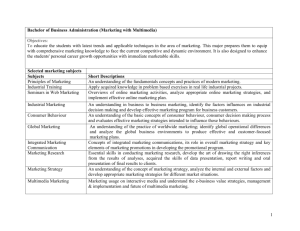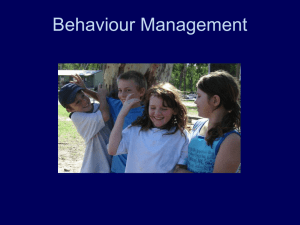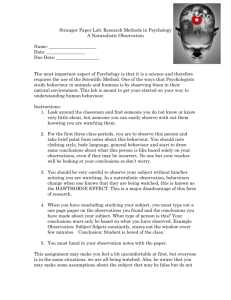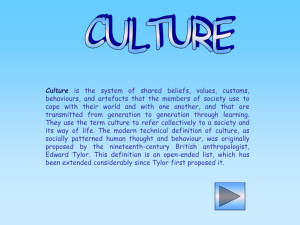File
advertisement
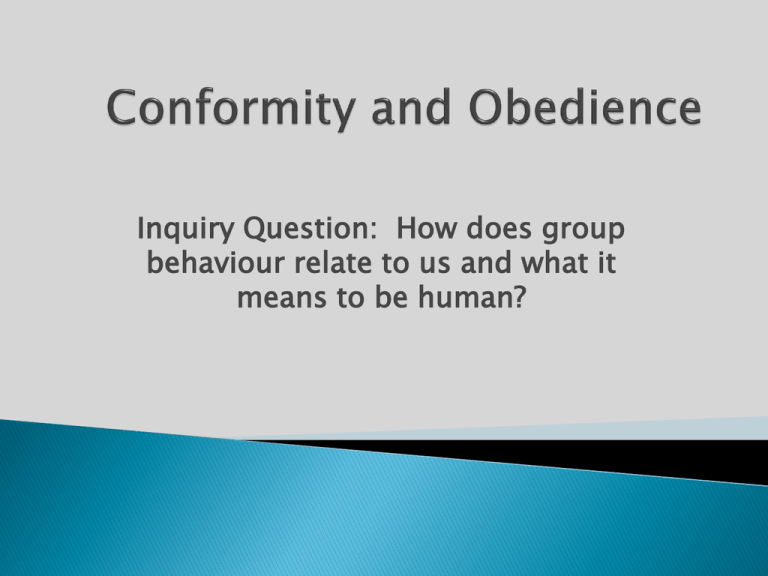
Inquiry Question: How does group behaviour relate to us and what it means to be human? Humanity is a social species – we evolved to survive in groups Group membership – we have a natural inclination to suppress our personal needs / wants in favour of the needs of the group’s needs / wants We seek interactions with others & those interactions shape our future responses and behaviours We learn our identity through group interaction: gender, class, age, culture Foraging Societies : hunter gathering societies - travelled in small groups and moved to different localities in their quest for food. Egalitarian societies like the !Kung of Christmas in the Kalahari Subsistence agricultural societies Stationary - cultivate fields of food and herd domestic animals. migrate to new land once their lands are exhausted. Can divide into troops, bands, tribes, chiefdoms. Developed in ancient Mesopotamia, Egypt, China and South America. These were groups who did intensive agriculture and stayed in one place, developing technologies to irrigate the land. At this time human subgroups started to form as class structures came into being and skills diversified i.e. kings, nobles, peasants Developed first in Europe, especially in England. Divisions occurred and even smaller human subgroups were formed as regions developed technologies and families began to work for wages. Groups were then defined by regions, and nation states which shared a common culture. For Example: They are interested in the benefits of being part of a cultural group. They are interested in the disadvantages and dangers of being in a cultural group. They consider the lives of people living within a cultural group. Determine what it takes to belong to a cultural group. Study the customs and traditions within a group which shape the behaviours of the culture. Read – Anthropology and Ethical Transformations and Anthropologists and the Military page 181 to 182 A Sociologist is interested in studying group behaviours because these behaviours are influenced by society. The feeling of belonging to a group is an essential element of living in society. We are part of many different groups, some formal (family, work) and others informal (friends, clubs) All groups need to establish solidarity - a feeling of social belonging amongst its members that unite the members of a group ◦ Ritual (symbolic behaviour) ◦ Customs (dress, speech, greetings and salutations) The most intimate of all groups Consists of two members ◦ Married couple ◦ Two friends Informal Groups: ◦ Gatherings of people where there are no explicit rules. A small group in which members share personal and emtional relationship ◦ Family ◦ Close friends ◦ Significant other Deeply invested - share deep concern for members Ties are very strong – can exert significant persuasion over members – expect a high degree of conformity An impersonal and/or formal gathering of people Individual’s role is measured by his/her contribution to common goal / purpose Often large groups – usually exert less influence on behaviour than primary groups A group that communicates over the internet Has a global reach Purpose is varied, but tend to facilitate social support, companionship, exchange information amongst those with a common interest Can be a part of one’s primary and secondary group New techniques have been developed to compensate for lack of face to face interactions ◦ Emoticons ◦ Slang and abbreviations A group associating for antisocial and / or criminal purposes Share the same characteristics of other groups Provides members with a sense of identity, power, common purpose & protection Appeals to those who tend to lack these from their primary and secondary groups “The gang is like my family man. They got my back. When you need something like some clothes or some food or some money or a place to crash they are there. When you need to talk they are there. When you got a beef they got your back. I love these guys man. They are my blood, my heart”(male 22 years). Groups est. expectations for how we should behave Rely on roles, norms and sanctions Sanctions: Penalty or reward to ensure conformity within a group ◦ informal: pat on back, compliment ◦ Formal: expulsion, imprisonment, execution How does the psychology of a collective differ from and interact with that of the individuals within it? Behaviour by a large group is highly influenced by the loss of responsibility of the individuals and the feeling of universality of behaviour Both are contingent on the size of the crowd – the larger the crowd the greater the loss of individual responsbility Crowd behaviour does not reflect existing rules, institutions and structures of society ◦ ◦ ◦ Purpose of the group is to accomplish a single goal or outcome Behaviour is usually spontaneous – response to crisis or disaster. Panic – the “irrational” response to a situation perceived as dangerous – can easily sweep through crowds Crowd behaviour is not a product of the crowd, but of the like-minded individuals that comprise the crowd “An individual in a crowd behaves just as he/she would alone, only more so” Floyd Allport (Sociologist) Crowd reinforces and intensifies the behaviour People make rational decisions whether or not to participate in collective behaviour – consider possible consequences ahead of time People are motivated by: self-interest Size of the group – we favour large over small groups (each individual has a personal “threshold” that must be met before they join in Lack of responsibility and consequence Thresholds vary for individuals within the group – leaders tend to be those with lower thresholds for responsibility & consequence Explains why some individuals leave a crowd if violence escalates while others stay involved Psychology A psychologist is not studying groups to explore the reasons behind group behaviour, they leave that to the sociologists. A psychologist is more interested in how groups influence individual behaviours. In other words, what influences you to join a club or group and how the group affects you. Social pressure can influence a person’s behaviour making them take part in things they would not normally take part in simply because other people around them are doing it. See Asch Experiment (You Tube) See Milgrim Study page 198 of your text. Psychologists also struggle with ethical questions, are these experiments ethical in your opinion? Why or Why not? Social belonging is based on the concept of solidarity. There are many different types of groups.
